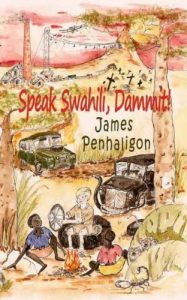The inspiring true story of a young boy’s chaotic life in a remote, wild, corner of East Africa.
James’s childhood is spent on an isolated gold-mine near Lake Victoria, Tanganyika, with just his sister and mother; his father tragically dying through injuries sustained from World War II. His upbringing is mainly left to a tribal ayah called Amina and an elderly Swahili man, and he learns to speak Swahili before English.
In this unusual setting he soon discovers some stark facts about life through tragedy and danger, but it is the local watu, imbued with kindness and irrepressible humour, that save him from despair, and with whom he learns to fish with home-made lines, eat insects and famously abuse the European hierarchy in real Swahili!
Known as ‘Jimu’ to his friends, he marks out his own country with a Sukuma boy named Lutoli, falls deeply in love with the beautiful, but older, German girl Gretchen and throws himself out of the back of a bus to avoid being sent away to school.
Once at school, in Arusha, James tends to mix with other non-conformers and presents a dilemma to teachers – he is a white boy with a ‘black spirit’. His gang gets up to nefarious enterprises, bringing them into a state of permanent conflict with the system.
James is fascinated with the history of Tanganyika back to the time when it was a German Colony until 1918. The unparalleled courage of the German leader Paul von Lettow Vorbeck against the British is a beacon to the young boy of what can be accomplished against adversity
Above all James discovers the world, and life, a little by education, a lot by accident, but overwhelmingly by fate and happenstance, in circumstances few people in the developed world have experienced.
James’s childhood is spent on an isolated gold-mine near Lake Victoria, Tanganyika, with just his sister and mother; his father tragically dying through injuries sustained from World War II. His upbringing is mainly left to a tribal ayah called Amina and an elderly Swahili man, and he learns to speak Swahili before English.
In this unusual setting he soon discovers some stark facts about life through tragedy and danger, but it is the local watu, imbued with kindness and irrepressible humour, that save him from despair, and with whom he learns to fish with home-made lines, eat insects and famously abuse the European hierarchy in real Swahili!
Known as ‘Jimu’ to his friends, he marks out his own country with a Sukuma boy named Lutoli, falls deeply in love with the beautiful, but older, German girl Gretchen and throws himself out of the back of a bus to avoid being sent away to school.
Once at school, in Arusha, James tends to mix with other non-conformers and presents a dilemma to teachers – he is a white boy with a ‘black spirit’. His gang gets up to nefarious enterprises, bringing them into a state of permanent conflict with the system.
James is fascinated with the history of Tanganyika back to the time when it was a German Colony until 1918. The unparalleled courage of the German leader Paul von Lettow Vorbeck against the British is a beacon to the young boy of what can be accomplished against adversity
Above all James discovers the world, and life, a little by education, a lot by accident, but overwhelmingly by fate and happenstance, in circumstances few people in the developed world have experienced.






